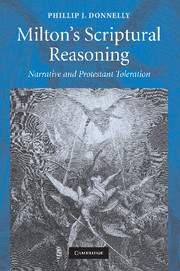Book contents
- Frontmatter
- Contents
- Preface and acknowledgments
- Abbreviations and editions
- 1 Introduction: Scriptural reasoning
- PART I SCRIPTURAL REASONING IN MILTON'S PROSE
- PART II BIBLICIST RHETORIC AND ONTOLOGY IN PARADISE LOST
- PART III BIBLICIST POETICS AND HERMENEUTIC ETHICS
- Notes
- Subject index
- Index of Scripture references
1 - Introduction: Scriptural reasoning
Published online by Cambridge University Press: 04 September 2009
- Frontmatter
- Contents
- Preface and acknowledgments
- Abbreviations and editions
- 1 Introduction: Scriptural reasoning
- PART I SCRIPTURAL REASONING IN MILTON'S PROSE
- PART II BIBLICIST RHETORIC AND ONTOLOGY IN PARADISE LOST
- PART III BIBLICIST POETICS AND HERMENEUTIC ETHICS
- Notes
- Subject index
- Index of Scripture references
Summary
What does John Milton's poetry actually do with Scripture? Insofar as the major poems of his maturity all present adaptations of biblical narrative, the theological aspects of Milton's poetry might seem unavoidable. Theologically oriented studies of Milton tend not to focus, however, on the biblical intertextuality whose weave makes up his poetic matter and form. This recurring biblical intertextuality is central to what I call Milton's “scriptural reasoning.” Paradise Lost, Paradise Regained, and Samson Agonistes are each unique in how they respectively engage biblical intertexts; yet they all seem intended to provoke re-readings of various biblical passages, opening up interpretive possibilities, even aporias, that might otherwise remain unnoticed. In this respect, each poem offers an implicit instance of biblical interpretation. By means of such poetic elaboration, these works offer not merely eisegetic speculation but an active interweaving of widely varying biblical texts, the interpretive effects arising from the fact that the poems are not themselves Scripture. The very mode of poetic-imaginative discourse, as such, thus serves to foreground the interpretive action involved in any reading of biblical texts. At the same time, Milton's mode of engagement with Scripture in his major poems also seems to parallel one of the hermeneutic ambitions of the Miltonic De Doctrina Christiana: that his own words would be glossed by the biblical text, rather than vice versa.
- Type
- Chapter
- Information
- Milton's Scriptural ReasoningNarrative and Protestant Toleration, pp. 1 - 24Publisher: Cambridge University PressPrint publication year: 2009

